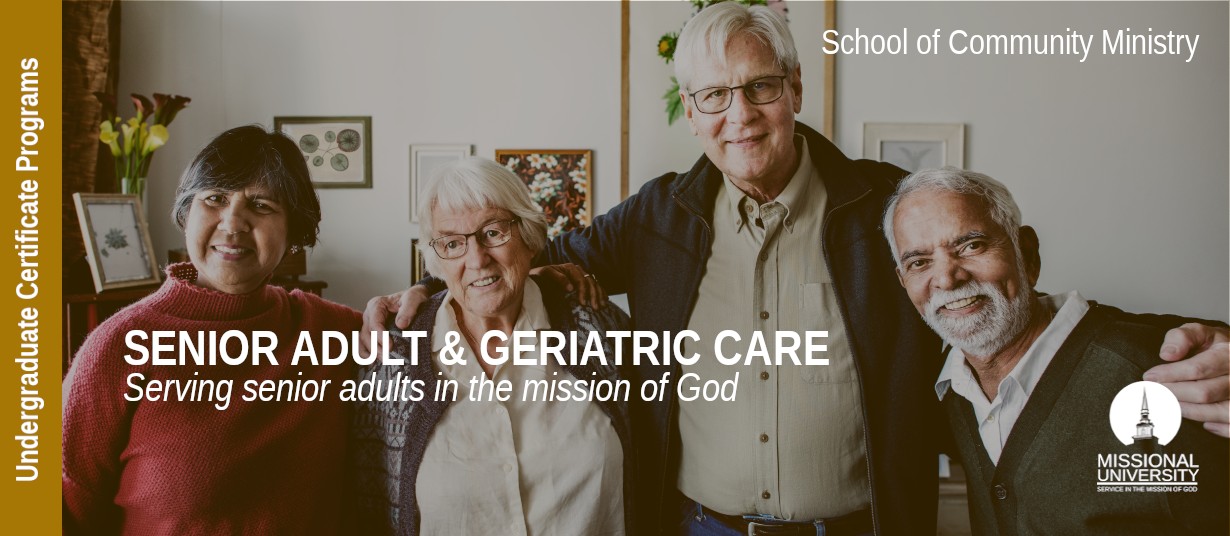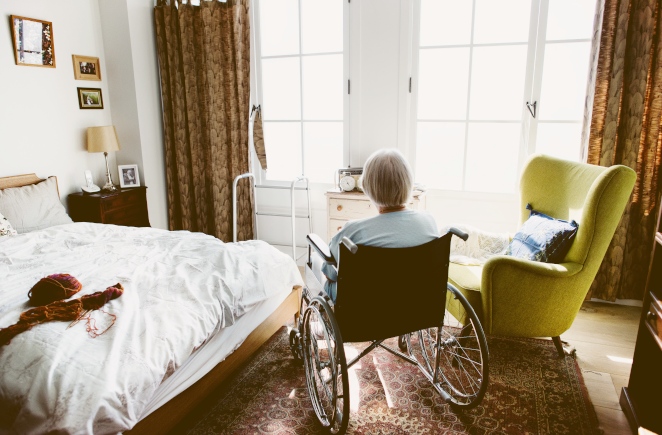
Online Undergraduate Certificate in
Senior Adult & Geriatric Care
⚜ Rarely Offered in Christian Universities, Bible Colleges or Seminaries
Expand Your Missional Service Today!
REQUEST INFORMATION
Ready to learn more about the
Undergraduate Certificate in
Senior Adult & Geriatric Care?
LEARN MORE NOW
The Undergraduate Certificate in Senior Adult & Geriatric Care offers community ministry practitioners, community health educators, congregational and faith community nurses, pastoral care providers, senior adult pastors, healthcare missionaries, healthcare chaplains, Christian social workers, and those involved in serving senior adult persons and their families the following capabilities:
-
- ability to articulate a Trinitarian theological foundation of family
- ability to articulate the terminology, concepts, and scope of social, cultural and health topics of importance in any type of engagement of older persons
- ability to utilize case reports, definitions, and discussions and determine where and how ethics apply to various types of abuse common to the elderly
- ability to be effective caregivers to senior adults by understanding the physical and spiritual dimensions of theories of aging, stereotypes, lifespan aging, models of aging, and caregiving
- competency in providing support systems to the elderly and their families to maintain and enhance functioning and well-being
- ability to apply theories and strategies of aging and caregiving to create an assessment and elder care plan
- ability to apply elder care in the context of senior adult service agencies, geriatric servics or long-term care administration
- ability to apply the sociocultural aspects of aging, elder economics, or multicultural elder issues to elder care
Senior Adult Care classifies its levels of care under six different options for senior care services: Independent Living, Assisted Living, Memory Care, Skilled Nursing, Affordable Housing, and Short-Term Care. While each type has its own uniquenesses, each level of care is designed to address the physical, social, and spiritual issues facing senior adults. The Undergraduate Certificate in Senior Adult & Geriatric Care provides missional leaders with the background to address the physical, emotional, social as well as spiritual issues of this vulnerable population group in each of these levels of care.
Program Features
-
Integrated practicums allow you to gain valuable real-world experience
-
Learn from academic practitioners from around the world
-
Credits earned in this certificate program can apply to a Missional University Bachelor degree program
Course Effort
Course Length
Credits Required
Program Cost
What Will I Study?
We offer the most comprehensive approach to serving among vulnerable persons in the mission of God.
The rapid decline of marriage and family as a social institution calls for understanding the family biblically and theologically. This course provides a Trinitarian theological foundation of family. The course will focus on practical insights for missional relationships so that families may thrive as they are on God’s mission amidst today’s unrelenting worldly pressures.
This is a survey course familiarizing multiple disciplines of students with the terminology, concepts, and scope of social, cultural and health topics of importance in any type of engagement of older persons. Students will gain an intimate understanding of the theories of aging, stereotypes, lifespan aging, models of aging, and caregiving. Biopsychosocial model of aging. Additionally students will be introduced to a broad range of professional involvements serving seniors.
In this course, students will utilize case reports, definition, discussion and determine where and how ethics apply to the various aspects of a case and to the individuals involved. Neglect, self-neglect, abuse (physical, mental, emotional, sexual, nutritional) are a few of the types of abuse common with elderly
This course engages the learner around spiritual care as part of the biopsychosocial model of care of the elderly. The elderly are both dispensers and receivers of spiritual caregiving. Sensitivity to understanding unfinished business, spiritual strengths and weaknesses, congruence and making meaning in the later years and at the end of life. Incorporating spiritual care helps healing, coping, hope.
This course looks at the unique aspects of social work practice pertaining to older adults and their families. Older adults face challenges in the later years that do not present at earlier ages, or present and need attended to in different ways than for younger adults or children. This course focuses on direct practice with older adults and their families. The course examines the social context of aging, the aging process, associated changes, and the effects on older persons and their families. Emphasis is on the nature of support systems and the social work role in maintaining and enhancing functioning and well being. The role of caregivers when elders are limited in their capacity to function independently is examined.
This course affords participants rich discussions, role plays, experience in interviewing seniors, identification of real-time community and family resources, creating an assessment and care plan. Students will engage with application of theories and strategies learned in prerequisite courses.
Choose ONE below:
Service Agencies and Programs for Older Adults come in all sizes and shapes. Some are more global in scope, others are condition-specific. A holistic approach across services is desirable for a continuum in many communities, though may vary by region, culture, custom. Students become fluent in describing and discussing programs, services and agencies that serve and are served by senior citizens around the world, requirements, qualifications (need-based, income-based) and funding sources, as appropriate. Additionally, a variety of programs in numerous countries and regions will be discussed and critiqued. Students gain skill in identifying categories, funding sources, goals, target audiences and other components of programs and agencies. Students will learn to review and assess program and service goals and objectives.
Discusses issues, services, methods, and interventions for the geriatric population and application of strategies for identifying and accessing services targeted for older adults and their families. Upon completion of this course, students will be able to gain knowledge on issues, services, methods, and interventions as they relate to practice with older adults.
Students will be introduced to the administration of long-term care facilities and services. Emphasis will be place on nursing home management, assisted living service, home health care, hospice, and skilled nursing facilities. This course will introduce students to careers in these facilities
Choose ONE below:
Students will participate in reading, critical thinking, paper writing, exercises, discussion on this important subject matter and paradigm of the aging experience. Participants will be invited to delve into the areas of social reality and perception that define lifespan experience and structures shaping aging on an individual and collective basis.
The economics of aging impacts every man, woman and child – from healthcare access, health care costs, access to healthy food and services, housing, transportation and care, health, wealth and financial prosperity. Implications for culture and society are somewhat different across countries and regions, and will be explored, discussed and charted during the course.
Students will participate in reading, critical thinking, paper writing, exercises, discussion on this important subject matter and paradigm of the aging experience.
When Can I Get Started?
We offer multiple start dates each year to give you flexibility in your education, life and work schedules.
JANUARY
MARCH
MAY
AUGUST
OCTOBER
A Career in Transforming Communities
Is this Your Mission?
Active Adult and Senior Programming Director, Activities Director for Senior Living, Adult Daily Living Center Coordinator, Art Center Director for Senior Adults, Assisted Living Resident Aide, Caregiver for Elderly, Chaplain, Christian Social Worker, Community Ministry Practitioner, Community Health Educator, Congregational and Faith Community Nurse, Cultural Diversity Coordinator for Spanish Speaking Seniors, Executive Director-Senior Living, Director of Senior Adult Outpatient Program, Director of Senior Community Services, Geriatric Home Health Aide, Geriatric Nurse, Geriatric Social Worker, Healthcare Missionary, Healthcare Chaplain, Manager of Pastoral Care, Manager of Pastoral Services, Mental Health Technician Geriatric, Pastoral Care Provider, Pastor of Pastoral Care, Pastor for Senior Adults, Pastoral Associate for Congregational Care, Pastoral Associate for Congregational Life, Pastoral Care Coordinator, Pastoral Care Director, Pastoral Care Program Coordinator, Pastoral Counselor, Pastoral Member Care Specialist, Pastoral Services Supervisor, Personal Support Specialist, Recreation Specialist (Senior/Active Adult Program), Senior Adult Care Provider, Senior Adult Caregiving Specialist, Senior Adult Community Education Instructor, Senior Adult Care Associate, Senior Adult Program Coordinator, Senior Adult Counselor, Senior Adult Day Assistant Coordinator, Senior Adult Outpatient Program Director, Senior Adult Pastor, Social Services Clinician Geriatric Social Worker
Request Information Now
How Much Will it Cost?
We offer tuition based upon country of residence. According to the Human Development Index, all countries around the world fall into one of four categories:
-
(Tier 1) - Very High Human Development
-
(Tier 2) High Human Development
-
(Tier 3) Medium Human Development
-
(Tier 4) Low Human Development
Our tiered global tuition makes higher education affordable for everyone world wide.

TIER COUNTRIES
100% Tuition
$295
per credit hour
3 credit course
$885

TIER COUNTRIES
80% Tuition
$236
per credit hour
3 credit course
$708

TIER COUNTRIES
60% Tuition
$177
per credit hour
3 credit course
$531

TIER COUNTRIES
40% Tuition
$118
per credit hour
3 credit course
$354
Tiered tuition based on country of origin and scholarships available. Find your country of residence here for more information.
Tuition may be further reduced by participating in the Sponsorship Program.
